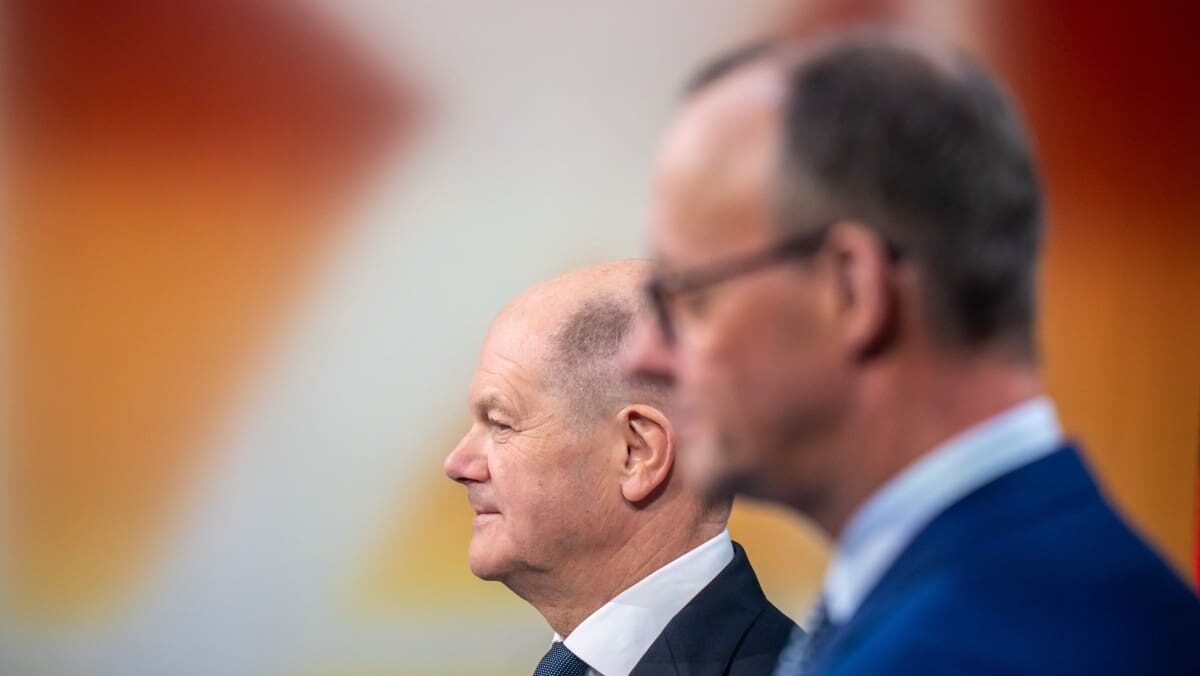
Olaf Scholz (L) and Friedrich Merz (R) take their places in a WELT TV studio ahead of a TV debate in Berlin on February 19, 2025.
Photo: Michael Kappeler / POOL / AFP
The centre-right CDU/CSU alliance won the German national elections on Sunday, February 23rd with 28.5% of the votes, while the right-wing Alternative für Deutschland (AfD) finished second on 20.8%, according to the final results announced on Monday.
The governing Social Democrats (SPD) achieved third place with 16.4%, their junior coalition partner, the Greens finished on 11.6%, and the fifth party to enter parliament is the hard-left Die Linke with 8.8%. The liberal FDP (4.3%) and the left-wing nationalist Bündnis Sahra Wagenknecht (4.97%) both failed to reach the 5% threshold needed for seats in the Bundestag.
Germany, Final results:
— Europe Elects (@EuropeElects) February 24, 2025
CDU/CSU-EPP: 29% (+5)
AfD-ESN: 21% (+11)
SPD-S&D: 16% (-10)
GRÜNE-G/EFA: 12% (-3)
LINKE-LEFT: 9% (+4)
BSW-NI: 5% (+5)
FDP-RE: 4% (-7)
FW-RE: 2%
Tierschutzpartei-LEFT: 1% (-1)
Volt-G/EFA: 1% (+1)
PARTEI-NI: 0% (-1)
+/- vs. Last election result
➤… pic.twitter.com/6nAS972c4w
The real winner of the election was the AfD which achieved its best ever result since forming in 2013, doubling its share of the votes compared to the 2021 election. The party was rewarded by the voters for its tough stance on immigration—a topic that dominated the election campaign following a string of terror attacks committed by failed asylum seekers.
The establishment parties, on the other hand, were all punished one way or another.
Despite gaining the most votes, the CDU/CSU suffered its second worst result since the Second World War, and only managed to increase its previous result by 4 percentage points—this was a stark reminder that the voters have not forgotten the failed migration and economic policies of former CDU chancellor Angela Merkel, who led the country between 2005 and 2021.
The current governing parties were also heavily punished for their pro-migration and radical climate policies which have led to a rise in crime, soaring energy prices, and an economic downturn. The SPD’s support decreased by almost ten percentage points—its worst ever result—the Greens’ support by 3 percentage points, and their former coalition partner, the FDP dropped out of the Bundestag altogether.
However, the new parliament will not deliver the change the electorate craves, as the CDU/CSU has ruled out cooperating with the AfD.
Instead, CDU leader Friedrich Merz will likely form another ‘grand coalition’ with the SPD, and be forced to drop any hint of conservative policies from its programme. The two parties have enough seats to form a majority—albeit a thin one—in the Bundestag, but they could choose to create a three-way government including the Greens. There is no other viable option for Merz.
A left-wing government with the SPD, the Greens, and Die Linke is also out of the question as the three parties do not have enough MPs to form a majority.
Die Sitzverteilung im Deutschen Bundestag 2025-29: pic.twitter.com/iPIvk6vxhi
— Detlef Spandau (@Detlef_Spandau) February 24, 2025
The fact that Friedrich Merz said he hopes to have a government in two months’ time, says a lot about how tough the negotiations with the SPD will be. Merz will have a hard time pushing through, ‘by Easter,’ his anti-immigration policies, tax cuts, and his desire to increase defence spending—because the Social Democrats will not allow it.
According to AfD co-leader Tino Chrupalla
a government with election losers, which Friedrich Merz is now forging together, will probably last less time than some people think.
Despite being perfectly aware of the political reality—and Merz’s intentions to isolate the AfD—the party’s other co-leader Alice Weidel said she is ready to talk to the CDU to fulfill “the will of the people, the will of Germany.”
The lack of enthusiasm for the next German government and the elections results in general was evident on Monday as European leaders failed to congratulate Merz, or did so cautiously.
The respective heads of the European Commission and the European Parliament, Ursula von der Leyen and Roberta Metsola, did not say a word about Germany—despite both of them belonging to the centre-right European People’s Party (EPP), of which CDU/CSU is a member.
French President Emmanuel Macron, whose own future as the head of state is in jeopardy, said he looked forward to working jointly with Merz for a “strong and sovereign Europe.”
Ich habe gerade mit @_FriedrichMerz gesprochen, um ihm zu seinem Sieg bei den Bundestagswahlen zu gratulieren.
— Emmanuel Macron (@EmmanuelMacron) February 24, 2025
Ich habe mich auch mit @OlafScholz ausgetauscht, um ihm an diesem Abend meine Freundschaft zu bekunden.
Wir sind mehr denn je entschlossen, gemeinsam Großes…
Hungarian conservative Prime Minister Viktor Orbán, on the other hand, congratulated the AfD, saying “the people of Germany voted for change in immense numbers.”
